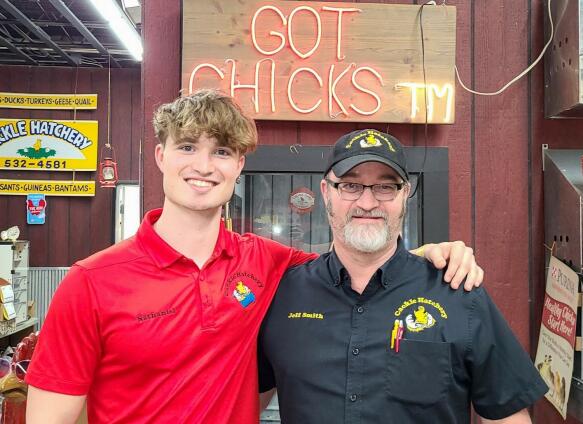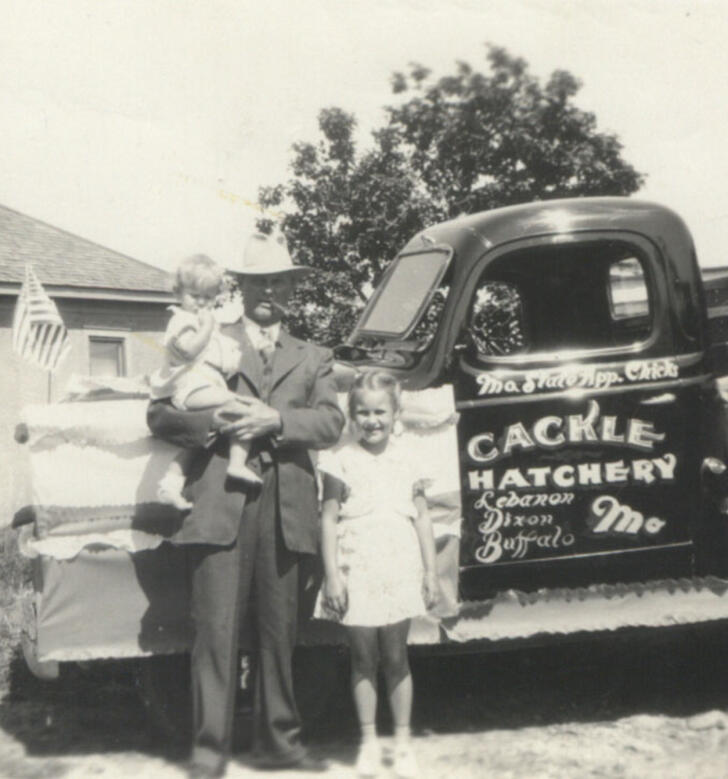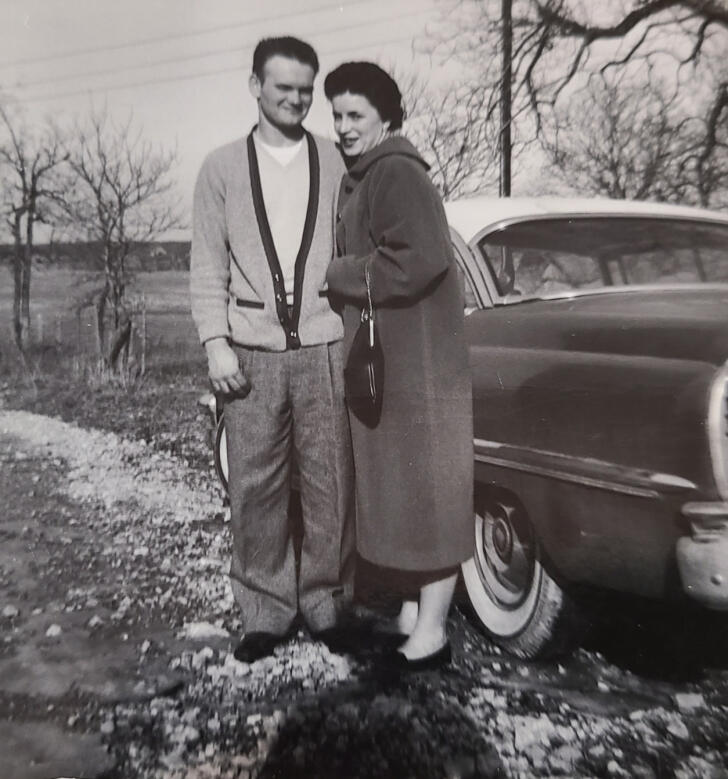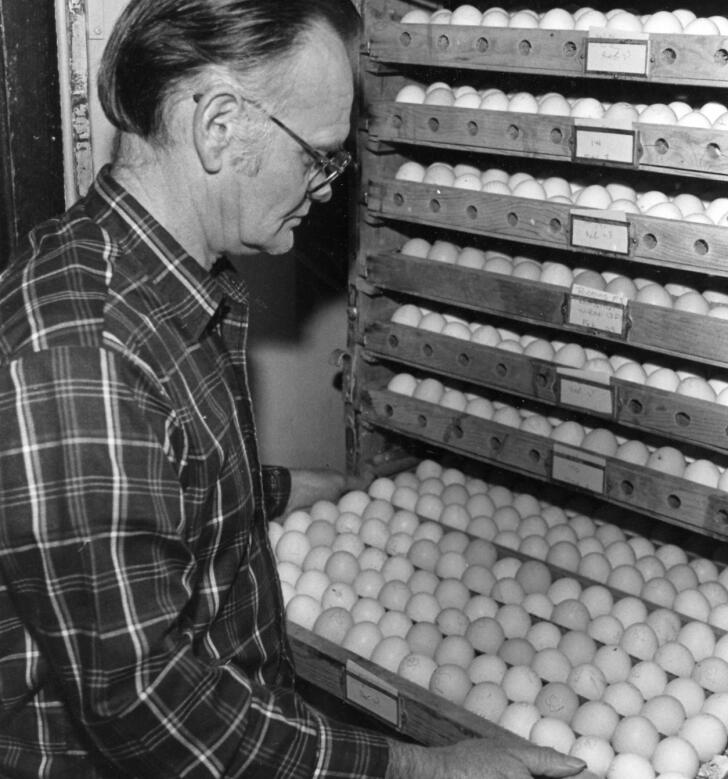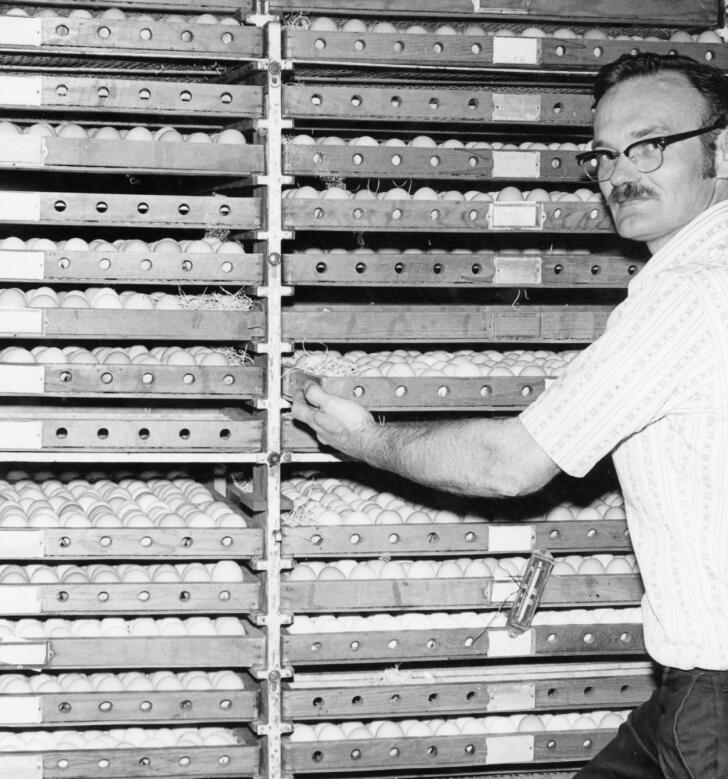
OMLET MEETS CACKLE: HATCHING CHICKS SINCE 1936
1936. That’s almost 100 years! Is it too big a question to ask what’s changed?
Well, yeah, this is our 88th year. I could tell you a long story! Back in America in the 20’s, 30’s, 40’s, little hatcheries were real popular. Every small town had a hatchery. People hatched for their household too, with kerosene incubators. There were a lot of inventions at that time.
But, by 1960 almost all the significant hatcheries, the backyard, non commercial ones, they all closed their doors. Because everybody was leaving the farm life - going to the cities. Refrigeration became a big thing, transit really changed, supermarkets sprung up, so the way people got chickens and eggs changed too.
We’re one of the few hatcheries with a long history - we survived that time. That’s the big change. Now, we’re on an upswing, because, once again, people are interested in growing their own food, turning back to self sufficiency.
Another major change is that chickens have leapt from a livestock to a pet category. It’s not uncommon for a big old million dollar estate to have three or four chickens scratching around! Movie stars have them - they’re therapeutic. You learn their activities, their interests, you’re the caregiver, you get a bond.

How did you, personally, get involved in the business?
My parents had moved to St Louis, and grandad called and said, “Why don’t you come home and try new stuff? I’ve got some ideas, there’s some rare breed interest. Let’s get into more varieties.” So I was back to the hatchery full time in 2007.
So there was a willingness to move with the times, diversify - which is so crucial to survival. Has being a family business fed into your ethos and values?
There are lots of things I like about our business. There's a lot of satisfaction - we create something. We’re into breeding and sustaining, which is creative. You get to go from beginning to end. Then of course there’s the fact that we get to build a business that creates jobs, has a role in society - hopefully jobs people enjoy - that’s fulfilling. And just being able to carry on something that’s been in the family - there is pride in that. We try to keep our human ethics within our culture - to treat our employees like a family; it’s very fulfilling.
My son, Nathaniel, graduated last year. I never pushed the business on him, because it’s demanding, you dedicate your life to it. But he’s 110% in the game - he enjoys it and is willing in his heart to jump in and carry on. I’m blessed that I have him to keep the company going in the right direction.
Can you talk me through the process of sending chicks out by mail? It sounds complex. How does it work?
So, basically, the post office has been delivering chicks for 100 years plus. When the chick hatches it has 72 hrs of yolk in its abdomen, it absorbs that slowly giving it hydration and nutrition. Mother nature has built in immunity - they can endure temperatures for that window, then that window passes and it needs critical elements to continue its life cycle. We ship on a Wednesday - by Friday our orders have arrived.
We run four or five trucks throughout the day. We make sure we meet their deadlines, get the boxes in the system and two days later, the post office is calling the customers - your chicks are here! We call it the train, once it starts you can’t get off till the work’s done. My grandmother, bless her heart, she used to joke, “Well, don’t die during chick season, ‘cos no one will make it to the funeral.” It’s dark, but it’s like that!

Ha! And when you’re shipping, even in that 72 hr window, is there anything you have to do to make sure the chicks are safe and comfortable in transit?
I look at the map, and I break it down into four categories: hot, warm, cold, really cold. When we pack the birds, we’ll look at the map, and I'll put out new instructions every night and tweak their packing for climate, so the vent size, the paper, excelsior (wood wool) for insulation. We also have heat packs if needed. So we basically fine tune the instructions on how they are packed. That’s difficult because, say I'm shipping to Alaska - you think it will be cold, but not necessarily! They’ll be on the plane and in transit 90% of the time. It’s not a black and white thing.
And is the postal system reliable enough?
Before, if it was across four or five states, it was by train. They struggled. At one point, distribution almost put us out of business. Now, the main distribution goes through FedEx and the post office takes it at regional level, which works really well. FedEx redesigned cargo holds - they reached out to us and asked what we needed, we worked together. They were great at helping us solve issues. 2023 was the best delivery system we’ve ever had for timeliness and top condition.
I understand you don’t use any artificial light? Could you talk me through your reasons - why is it best for the chickens? And what does it mean in terms of logistics?
All of our breeding sites - and we have 70 different locations, we don’t have our birds in one location, it’s better and safer that way for hygiene - they’re on Amish farms with no electricity. We let mother nature dictate our production. We may not be like some places that put everything on lights, but we make it as natural as we can; our chick season is when it is. We think it's better on the hens.
When Hanns (Omlet Co-Founder) came to visit you guys, he mentioned some unique Robin incubators that were really beautiful pieces of equipment - as a design company we’re always interested in engineering and how things work. Could you tell me a bit about those please?
We’re not what I'd call a fully modern hatchery. We use vintage Robin incubators, made out of redwood, produced back in the 40’s and 50’s. These are wooden cabinets with steel rods through the middle, used to rotate the eggs. We’ve modified them, tweaked the misting for humidity, added electronic controls, but we still have some of the original turners. The oldest Robin incubator we have has had roughly 21,845,000 eggs set in it during its lifetime.
My grandad loved to tinker with incubator design, so we have some homemade ones too, and some are what we call nature form - with aluminum, fiber form. But yeah, the company we got our vintage ones from back in the day has gone out of business, so our next step will be a new layout or building at some point - but not yet.
Cackle is renowned for its prestige and expertise in breeding and genetics. Which breeds are unique to you and why? Do you have any personal favorites?
I would say we’re in the top of the sector for quality - although certainly a lot of our breeds are for backyard, not for show. In America the standard is set by the APA; we have certain breeds to meet these standards. So, the Rhode Island Reds, we have three varieties - our basic, our exhibition and a bantam, which is a showtype too.
As far as genetics go, we have feather sexing programs, and other breeds that we try to work on every few years to try to improve them, depending on our objective. With a lot of our breeds, we do selective breeds with feather line, for a short feather line and a long feather line. Then, once we set that standard, we can take a long feather rooster and a short feather hen, then those chicks will throw long on female, short on male. And the reason we do that is because vent sexing (a process of sexing birds manually) is rough on the birds and it’s very limited. But if we create a feather sexing program, it’s a lot better on the birds. Feather sexing genetics is really good for that. But you go on YouTube - there’s lots of misinformation out there on it. It’s not something you can understand just by going on the internet.
Some of my favorite breeds - well, I’ve always had a fascination for standard Old English Game, Yokohamas and Phoenix varieties, the island type birds and Sumatra - I’ve always had an interest in them. I love the exhibition and show type breeds and working on them. Right now, I'm working on exhibition Rhode Island Reds, Buff Orpingtons and Silver Laced Wyandottes. I’m also working on a new Golden Laced Wyandotte. I always want something better!
favorite
breeds
Your passion is inspiring. We’re newbies compared to Cackle - we celebrate our 20th birthday this year. But when Omlet began, it was with a question: can a coop change the way people think about chickens, and reframe them from farm animal to pet? We wanted to redesign chicken keeping so anyone could have the confidence to have their own flock and experience the wonder it brings. You guys were pioneers in the hatchery business. Did you see the popularity of backyard flocks coming? What is it that’s so special about chickens?
Well honestly, maybe it was just the way I was. I moved away, but - and I think this is true of lots of people I’ve known from rural areas, who had that desire to get back - chickens always had a fascination. I think a lot of people might remember them from grandma’s house, say. A lot of people have that distant memory, some aspect of farm life, which I always figured would have a pull.
And now, demand keeps going higher and higher - we’re watching so many people embrace chickens entering the pet category and enjoying them. I think they’re here to stay. Chicken keeping - it’s something anyone can do. Look at a cow, you need acres. But anyone can start out with a couple of chickens.
When I was a kid, we always had chickens. I would get home, take a bucket, turn it upside down and get them to come on over. I’d see how each one was growing, changing. You see their activities, their personalities - you want them to like you! You learn how to interact with them and they can give you that attention. They depend on you too, that satisfies some natural stuff that we all have: to nurture and take care, to instill that bond. It goes deep.
Visit Cackle Hatchery’s website for more information on their rare and exclusive breeds and hatching schedule.
